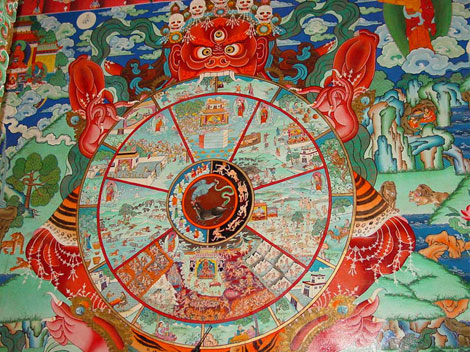
Contrary to what is accepted in contemporary society, the Buddhist interpretation of karma does not refer to preordained fate. Karma refers to good or bad actions a person takes during her lifetime. Good actions, which involve either the absence of bad actions, or actual positive acts, such as generosity, righteousness, and meditation, bring about happiness in the long run. Bad actions, such as lying, stealing or killing, bring about unhappiness in the long run. The weight that actions carry is determined by five conditions: frequent, repetitive action; determined, intentional action; action performed without regret; action against extraordinary persons; and action toward those who have helped one in the past. Finally, there is also neutral karma, which derives from acts such as breathing, eating or sleeping. Neutral karma has no benefits or costs.
The Cycle of Rebirth
Karma plays out in the Buddhism cycle of rebirth. There are six separate planes into which any living being can be reborn -- three fortunate realms, and three unfortunate realms. Those with favorable, positive karma are reborn into one of the fortunate realms: the realm of demigods, the realm of gods, and the realm of men. While the demigods and gods enjoy gratification unknown to men, they also suffer unceasing jealousy and envy. The realm of man is considered the highest realm of rebirth. Humanity lacks some of the extravagances of the demigods and gods, but is also free from their relentless conflict. Similarly, while inhabitants of the three unfortunate realms -- of animals, ghosts and hell -- suffer untold suffering, the suffering of the realm of man is far less.
The realm of man also offers one other aspect lacking in the other five planes, an opportunity to achieve enlightenment, or Nirvana. Given the sheer number of living things, to be born human is to Buddhists a precious chance at spiritual bliss, a rarity that one should not forsake.





